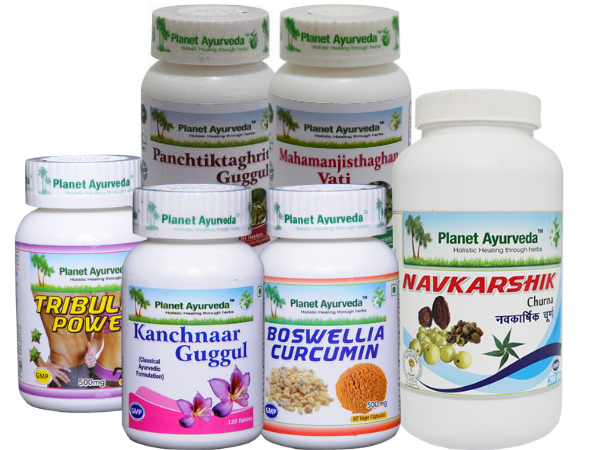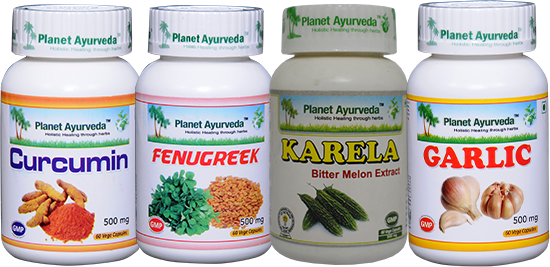Herbal Remedies for Autoimmune Polyglandular Syndrome ! Schmidt’s syndrome
ABSTRACT
There are various types of conditions from which people are suffering these days. Some of the disease names are heard and some are never heard . Some of the diseases are even new for physicians and it makes us question the evolution of the human body. Is the human body evolving? The answer to this question is “Yes”. But the evolution it is showing is not the one which makes it stronger but seems like evolution is making the human body more prone to develop unwanted changes which makes it more and more sick. There are around 3-4 new diseases which are discovered every year. In this article we will discuss one such disease and its name is Autoimmune polyglandular syndrome or schmidt’s syndrome. The Article also suggests some Ayurvedic formulations which can be used to manage this condition.
INTRODUCTION
Autoimmune polyglandular Syndrome has three types which are recognised as APS1, APS2 and APS3. This condition is a rare X- linked syndrome of immunodysregulation, polyendocrinopathy and enteropathy. The condition generally arises due to the mutation in FOXP3 gene which is also called as APS. All three types of Autoimmune polyglandular Syndrome are characterised by sequential or simultaneous deficiencies. These simultaneous deficiencies are in the Functioning of several endocrine glands that have a common cause. The aetiology or cause of deficiencies is mostly autoimmune response of the body. As mentioned most cases are autoimmune but in certain cases the triggers can be virus or dietary supplements.

So, let’s discuss the Autoimmune polyglandular Syndrome in detail
Types of Autoimmune Polyglandular Syndrom
There are three types of Autoimmune polyglandular Syndrome
Autoimmune polyglandular syndrome type 1 is very rare and is a complex condition which is a recessively inherited disorder. In this condition there is an immune cell dysfunction with a lot of autoimmunities. This present with the group of life threatening endocrine gland and gastrointestinal dysfunction. The second type of Autoimmune polyglandular Syndrome is an autosomal dominant syndrome due to multifactorial gene involvement. This results in adrenal insufficiency along with hypothyroidism and type 1 diabetes.
The third type of Autoimmune polyglandular Syndrome is an autoimmune condition which is typically present in middle aged females. This syndrome results in the failure of glands which are functioned for producing hormones.
Out of these three the second type is the most common one. This condition is called Schmidt syndrome. Now, moving further in the article let’s discuss Autoimmune polyglandular Syndrome type 2 or Schmidt syndrome in detail.
Symptoms of Autoimmune polyglandular Syndrome type 2/ Schmidt syndrome
Initially in case of Symptoms of Autoimmune polyglandular Syndrome type 2/ Schmidt syndrome, the patient presents with isolated endocrine dysfunction and later on tends to show non endocrine dysfunction as well. The patients with this condition have vague symptoms. Those symptoms are as following:
- Weight loss
- Fatigue
- Nausea followed by vomiting
- Generalised weakness
- Anorexia and pain in abdomen
- Polyuria and polydipsia
- May be diarrhoea
- Muscle along with joint pain is also observed
- In some cases psychiatric manifestations are also observed
Diagnosis of Autoimmune polyglandular Syndrome type 2/ Schmidt syndrome
The diagnosis of Autoimmune polyglandular Syndrome type 2/ Schmidt syndrome must full two out of following three criterias:
- Primary adrenal insufficiency also called as addison’s disease
- Autoimmune thyroid disease, known as grave’s disease as well
- Hypothyroidism along with Type 1 Diabetes mellitus
Treatment of Autoimmune polyglandular Syndrome type 2/ Schmidt syndrome
The treatment in this case is done symptomatically. If there is presence of hypothyroidism then the hypothyroidism will be treated accordingly. If there is presence of Type 1 diabetes then type 1 diabetes is treated and so on as per patient test results along with the patient’s symptoms.
Ayurvedic aspect of Autoimmune polyglandular Syndrome/ Schmidt’s syndrome
Ayurveda, which is called the science of life, has many hidden gems. All we need to do is to search and imply. Conditions like Autoimmune polyglandular Syndrome/ Schmidt’s syndrome are really well managed through AYurvedic herbs and the recurrent disturbance these types of conditions cause can be prevented.
Autoimmune polyglandular Syndrome/ Schmidt’s syndrome is a condition in which there is imbalance in the bodily doshas and this imbalance results in the occurrence of this condition.
Ayurvedic herbs like Kanchnnar, Shallaki, haridra, haritaki, bibhitaki, amla, Giloy, gokshura can play a very important role in management of Autoimmune polyglandular Syndrome/ Schmidt’s syndrome.
Herbal formulations by Planet Ayurveda for Autoimmune polyglandular Syndrome type 2/ Schmidt syndrome
Planet Ayurveda is a leading herbal formulations manufacturing company which is dealing with more than 500 product ranges. The organisation also supplies its products to various parts of India and to many other countries as well. The products are approved by the FDA, US and have all types of certifications. All of the products are totally herbal and are manufactured with the best herbs. The herbs are collected from various regions of India. The herbal formulations are prepared according to the ancient ways explained in the Ayurvedic texts and give really impressive results. These formulations are manufactured and packed under the strict supervision and guidance of MD Ayurveda experts. The Ayurvedic formulations are advised in a combination, in many types of conditions and have very fruitful impact. The formulations which are given in Autoimmune polyglandular Syndrome type 2/ Schmidt syndrome are as follows:
Product List
- KANCHNAAR GUGGUL
- BOSWELLIA CURCUMIN
- NAVKARSHIK CHURNA
- PANCHTIKTAGHRIT GUGGUL
- MAHAMANJISTHAGHAN VATI
- TRIBULUS POWER
Product Description
1. KANCHNAAR GUGGUL
Kanchnnar guggul is a classical preparation. The formulations work fantastically in controlling hypothyroidism in patients with Autoimmune polyglandular Syndrome type 2/ Schmidt syndrome. The formulation has ingredients like kanchnar (Bauhinia variegata), amalaki (Emblica officinalis), Haritaki (Terminalia chebula), Varuna Bark (Crataeva religiosa), Guggul (Commiphora mukul) and many others. All these ingredients help in the impressive pacification of kapha dosha in the body and due to presence of guggul microchannels (which are also called as srotas) are also cleared. Guggul also has healing properties and helps in the elimination of endotoxins as well.
Dosage: Two tablets twice a day after meals with lukewarm water
2. BOSWELLIA CURCUMIN
Boswellia Curcumin is a patent Planet Ayurveda’s formulation which has Shallaki (Boswellia serrata) & Haridra (Curcumin longa). Both of these herbs have a very great effect in the pacification of Vata and Kapha dosha. Thus the formulation has a great impact on pains which are present in this case. These capsules by Planet Ayurveda have a very great effect on purification of Srotas or micro channels as well. Boswellia curcumin also works to enhance and balance the digestion process which in turns results in less accumulation of endotoxins in the body. The capsules are completely vegetarian and do not have any type of side effects.
Dosage: One Capsule twice a day after meals with lukewarm water
3. NAVKARSHIK CHURNA
Navkarshik Churna is a powderous preparation which has a blend of various herbs. Formulation has a combination of herbs like Amla (Emblica officinalis), Haritaki (Terminelia Chebula), Bahera (Terminalia bellerica), Neem (Azadirachta indica), Manjishtha (Rubia cordifolia) and many others. The Churn is especially prepared to scrape out the toxins from the body. All of the herbs or ingredients in this formulation are used in pure form and the formulation has no side effects. Navkarshik churna is a n excellent ama expellent and also clears the channels which are clogged due to accumulation of ama. The powder gives wonderful results in autoimmune polyglandular syndrome or Schmidt’s syndrome.
Dosage: One tsp twice a day after meals with lukewarm water
4. PANCHTIKTAGHRIT GUGGUL
Panchtiktaghrit guggul is a very impressive Cow’s ghrit based preparation which has an impressive effect in various kinds of conditions. As its name suggest “Panchtikta” which means it has five ingredients and these five ingredients are astringent in taste.The ingredients are Neem (Azadirachta indica), Giloy (Tinospora cordifolia), Vasa (Adhatoda vasica), Patola patra (Trichosanthes dioica) and kantkari (Solanum xanthocarpum) along which guggul (Commiphora mukul) and Cow’s ghrit (Clarified butter prepared from Cow’s milk). It is a formulation that has an impact on the entire body and works by enhancing the body’s metabolism. The panchtiktaghrit guggul is known to maintain the overall health of the person.
Dosage: Two tablets twice a day after meals with lukewarm water
5. MAHAMANJISTHAGHAN VATI
Mahamanjisthaghan vati is an impressive formulation which has only one ingredient and that is manjistha (Rubia cordifolia). The role of this formulation is in blood purification and it also acts as a brilliant immunomodulator. The formulation works for many symptoms related to Autoimmune polyglandular Syndrome type 2 or Schmidt syndrome. Due to its immunomodulatory effect it has its impact on the body’s metabolism and also results in pacification of doshas. The herb is very well known for its blood purification effect and has its positive impact on the liver as well. The tablets are having impressive results in this condition and prepared under the strict guidance of MD Ayurveda Experts
Dosage: Two tablets twice a day after meals with lukewarm water
6. TRIBULUS POWER
Tribulus power capsule is a patent product of Planet Ayurveda that has only one herb as its ingredient and it is Gokshur (Tribulus terrestris). Gokshur has an amazing effect in this condition as it has a great impact by lowering blood sugar levels. Not just blood sugar or glucose, this also has a positive impact on high blood pressure as well. Tribulus power helps in eliminating toxins from the body as it is having antioxidant effects. Tribulus power is a very impressive product and it gives great results in boosting physical stamina as well. It is totally vegetarian and has no side effects.
Dosage: One Capsule twice a day after meals with lukewarm water
Contact Planet Ayurveda Support Team to provide you the costing/ordering and delivery information at – costing.planetayurveda@gmail.com or Call at 0172-521-4040 (India), +91-172-521-4040 (Outside India) or Whatsapp at (+91) 842-749-4030.
Conclusion
Autoimmune polyglandular Syndrome/ Schmidt’s syndrome is a condition which is difficult to diagnose as a patient must develop symptoms related to multiple systems. But with Ayurvedic formulations the situation is quite manageable and patients get relief gradually. But of course one has to follow the diet completely as diet plays an important role in our body’s working. Body’s metabolism and body’s health depends on the food we eat and also on the lifestyle we are living. Ayurveda is a natural way of healing and one must opt to follow the natural ways so that recurrent flare up of the situations can be avoided or prevented.





